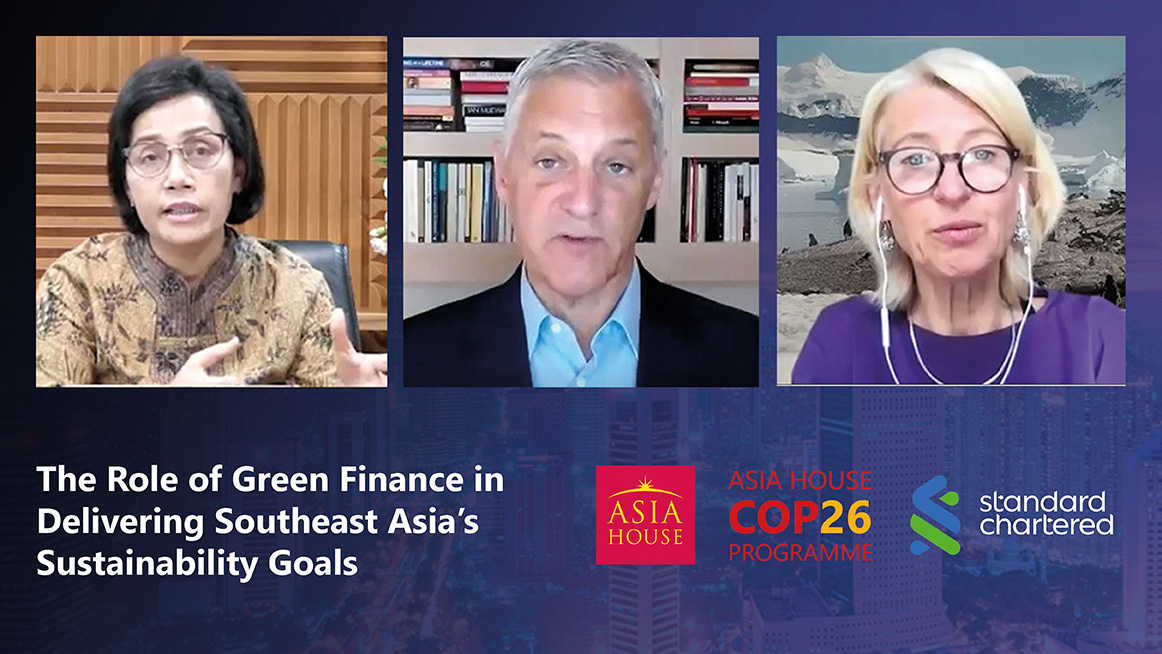Driving commercial and political engagement between Asia, the Middle East and Europe
Driving commercial and political engagement between Asia, the Middle East and Europe
Driving commercial and political engagement between Asia, the Middle East and Europe

Indonesia will need US$5.7billion every year to fund its energy transition, the country’s Finance Minister, Sri Mulyani, told an Asia House audience today (30 September), with the government exploring carbon markets to help finance the shift to net zero.
Speaking from Jakarta during an Asia House conference with Standard Chartered, Sri Mulyani revealed there is political backing for the establishment of a carbon market to help fund the transition. “We discussed this in parliament last night, and there is strong support,” she said.
However, policymakers want to see a clear roadmap to zero emissions, and Indonesia is in discussion with the Asian Development Bank, among others, to develop plans.
Sri Mulyani also said that Indonesia’s shift to net zero needs to be just and affordable, with the private sector doing more to mobilise the necessary funds. If the transition raised people’s cost of living, public support for the measures could be eroded, she said. “If the cost of living is going to be too high to bear, you are not going to see social acceptance.”
Indonesia, which takes over the G20 presidency next year, is highly dependent on coal for its energy supplies, with demand likely to rise. Indonesia is using a mixture of tax incentives and subsidies to promote the transition to renewables, and is an active issuer of green bonds, but more resources are needed, the minister warned.
“If you rely only on the government budget, that’s not going to be adequate,” she said.
Blended finance, which brings together private- and public-sector money, is seen as playing an important role in directing funds to climate-change mitigation efforts, including in Southeast Asia – a region particularly vulnerable to the impact of climate change.
Bill Winters, Group Chief Executive of Standard Chartered, said the financing gap between the funds Southeast Asia needs and what is currently available was “staggering”.
“Asia needs US$3.1 trillion… by 2030, just to support the basic climate compatible infrastructure,” he said.
While Standard Chartered research showed there was “a pretty clear line of sight” on where 60-70 per cent of the required funds for developed countries was coming from, that fell to around 30 per cent in Southeast Asia. However, better marshalling of resources could address the problem, Winters said. “The gap can be bridged.”
Winters said a global market in carbon offset credits would be important, and that much work has been done to increase confidence among stakeholders that such credits are of the highest quality and integrity.
Green bonds, designed to fund climate change mitigation efforts, have grown in popularity among investors in recent years, despite some concerns that not all the projects they finance are truly green. Issuance has held up during the pandemic but remains small.
Ingrid van Wees, Vice President for Finance and Risk Management at the Asian Development Bank, said such bonds made up just one per cent of Asian issuance.
Among factors constraining growth in green financing was an absence of carbon pricing and trading schemes, a proliferation of fossil fuel subsidies worth up to US$35 billion, and a lack of green projects.
The conference, held in partnership with Standard Chartered, was convened as part of the Asia House COP26 Programme.
Watch the discussion in full
JOIN OUR MAILING LIST to receive Asia House insights, analysis and research direct to your inbox.
